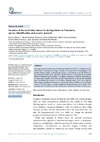Please use this identifier to cite or link to this item:
https://accedacris.ulpgc.es/handle/10553/60021
| Título: | Invasion of the dark false mussel in shrimp farms in Venezuela: Species identification and genetic analysis | Autores/as: | Lodeiros, César González Henríquez, María Nieves Cuéllar-Anjel, Jorge Hernández-Reyes, Dailos Medina-Alcaraz, Carolina Quinteiro, Javier Rey-Méndez, Manuel |
Clasificación UNESCO: | 251092 Acuicultura marina | Palabras clave: | Dreissenidae Invasive alien species Bivalve mollusks Shrimp culture |
Fecha de publicación: | 2019 | Publicación seriada: | BioInvasions Records | Resumen: | An inspection was carried out at shrimp farms located South West of Lake Maracaibo (Zulia State, Venezuela), with high incidences of mussel bivalve. Morphological and genetic analysis helped to identify the species as the dark false mussel Mytilopsis leucophaeata Conrad, 1831, and this is the first record of the species from tropical waters of northern South America. The highest incidences of mussels were detected in ponds and channels but no live mussels were observed in the coastal intertidal area surrounding the entrances of the farms, although empty shells were detected there, suggesting their former presence. The environmental conditions of the artificial system of shrimp culture, is a niche suitable for the proliferation of the bivalve. The consequences of the presence of this bivalve in the production of shrimp are discussed. | URI: | https://accedacris.ulpgc.es/handle/10553/60021 | ISSN: | 2242-1300 | DOI: | 10.3391/bir.2019.8.4.12 | Fuente: | BioInvasions Records [ISSN 2242-1300],v. 8(4), p. 838-847 |
| Colección: | Artículos |
Citas SCOPUSTM
14
actualizado el 08-jun-2025
Citas de WEB OF SCIENCETM
Citations
13
actualizado el 08-jun-2025
Visitas
261
actualizado el 30-nov-2024
Descargas
222
actualizado el 30-nov-2024
Google ScholarTM
Verifica
Altmetric
Comparte
Exporta metadatos
Los elementos en ULPGC accedaCRIS están protegidos por derechos de autor con todos los derechos reservados, a menos que se indique lo contrario.
